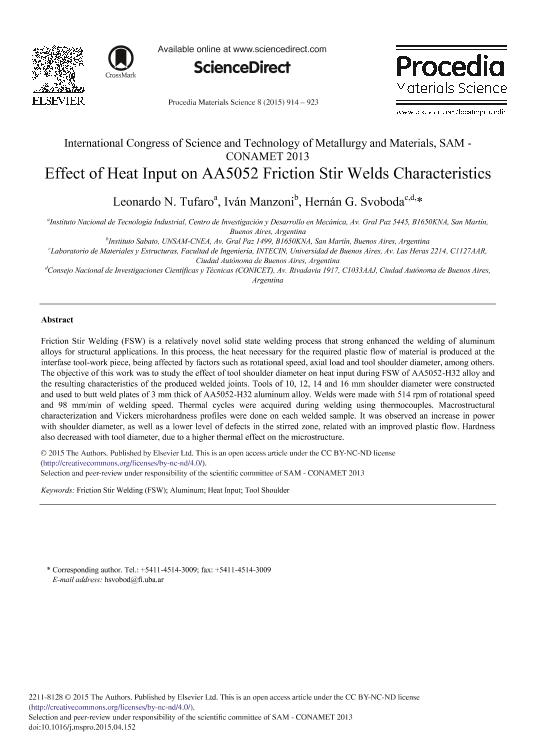Artículo
Effect of heat input on AA5052 friction stir welds characteristics
Fecha de publicación:
08/2015
Editorial:
Elsevier
Revista:
Procedia Materials Science
ISSN:
2211-8128
Idioma:
Inglés
Tipo de recurso:
Artículo publicado
Clasificación temática:
Resumen
Friction Stir Welding (FSW) is a relatively novel solid state welding process that strong enhanced the welding of aluminum alloys for structural applications. In this process, the heat necessary for the required plastic flow of material is produced at the interfase tool-work piece, being affected by factors such as rotational speed, axial load and tool shoulder diameter, among others. The objective of this work was to study the effect of tool shoulder diameter on heat input during FSW of AA5052-H32 alloy and the resulting characteristics of the produced welded joints. Tools of 10, 12, 14 and 16 mm shoulder diameter were constructed and used to butt weld plates of 3 mm thick of AA5052-H32 aluminum alloy. Welds were made with 514 rpm of rotational speed and 98 mm/min of welding speed. Thermal cycles were acquired during welding using thermocouples. Macrostructural characterization and Vickers microhardness profiles were done on each welded sample. It was observed an increase in power with shoulder diameter, as well as a lower level of defects in the stirred zone, related with an improved plastic flow. Hardness also decreased with tool diameter, due to a higher thermal effect on the microstructure.
Palabras clave:
Friction Stir Welding
,
Aluminum
,
Heat Input
,
Tool Shoulder
Archivos asociados
Licencia
Identificadores
Colecciones
Articulos(INTECIN)
Articulos de INST.D/TEC.Y CS.DE LA ING."HILARIO FERNANDEZ LONG"
Articulos de INST.D/TEC.Y CS.DE LA ING."HILARIO FERNANDEZ LONG"
Citación
Tufaro, Leonardo Nicolás; Manzoni, Iván; Svoboda, Hernán Gabriel; Effect of heat input on AA5052 friction stir welds characteristics; Elsevier; Procedia Materials Science; 8; 8-2015; 914-923
Compartir
Altmétricas




